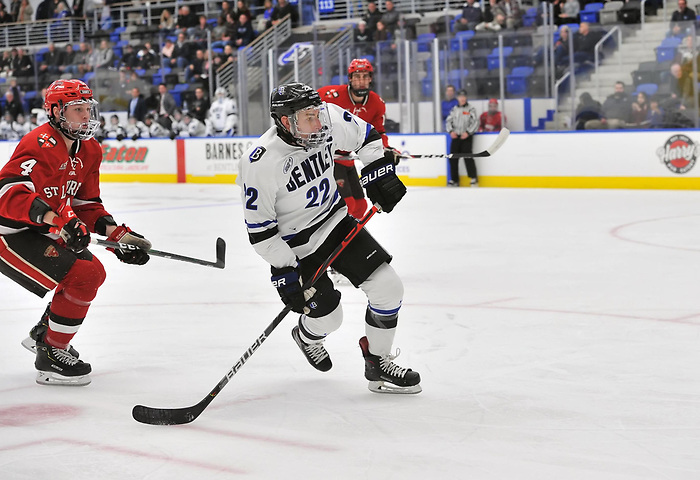
If you’re like me, you probably sat by your computer to watch the last week unfold in real time.
You watched the world continually change, minute after minute, through social media and news alerts. Sports adapted to atmospheres without crowds before shutting down for the interim time.
Conference tournaments were canceled, and then the NCAA tournament, a completely and previously unthinkable resolution on Monday that became reality by Thursday.
The 2019-20 college hockey season is over.
Arena rinks are dark.
The excitement of the quarterfinal round didn’t play out this weekend. There are no overtime thrillers or emotional explosions. There are no single-elimination semifinal games to be had, no lawn sales of equipment on the ice, and no trophies. No shirts and hats precede banner raisings in the fall. There is no final, congratulatory image seared into our minds.
There is just … nothing.
I always found true support in our community, and as the initial storm passed, the underneath heart of the college hockey universe shone through the darkness of what we’re enduring. I spoke with several people, all of whom openly talked about this with the maturity it warrants. They all expressed the disappointment for each other, but they also quickly minimized the impact over the greater story unfolding.
It’s the light hatching from the darkness of this past week.
The messages of support comforted me during this week because I leaned on others to validate my fears. We all leaned on each other and shared the weight and gravity of the moment. The larger base made it easier to bear.
Somewhere, Bill Withers probably smiled.
It generated hope, and it traversed a landscape devoid of ageism or geographic parochialism. It rose above the sports caste system to break down walls. It joined us in our isolation and fear but shattered our silos with resolve and determination. It drew us closer together even as we remained physically distanced – both literally and figuratively.
it’s what we do every time the world needs a big bit of goodness. The hockey spirit is defined by our ability to look beyond a person’s makeup. We value bonds over the game and mix personal relationships into chemistry more than any other sport. The hockey people I meet are always wonderfully tolerant with a quick wit, the kind of people willing to take it as well as dish it. The interactions are sacred, and that’s exactly what we needed last week.
I thought about people like Clarkson senior Devin Brosseau, my last interview of the season for the Hockey Humanitarian Award.
His college career ended in a blink, but he isn’t defined by anything on the ice. Brosseau earned a second consecutive nomination for the Hockey Humanitarian Award this year, and I had an opportunity to interview him about his work up at Clarkson. He was friendly, intelligent, and caring, with an absolute passion for helping people. Since he’s from Montreal, I had to take a good-natured shot at the Canadiens when we spoke, but I hung up the phone thinking I talked to someone who challenged me to want to do more.
Those people are what we can lean on.
I never wanted to broadcast at a place other than Bentley because I always felt like the league was my winter family. I value phone calls and seeing people at the arena because our broadcasters are great and our sports information directors are awesome. For me, it’s the people like Chris Lerch, Ed Trefzger, Scott Biggar, Nikolai Busko, Jarrett Abelson, Kyle Mack, Ralph White and Jimmy Connelly who make this worthwhile.
That’s not to mention having a league with Army West Point and Air Force. The cadets will graduate into an unprecedented unknown while remaining willing to serve all of us. I’m already planning for October to start the road back to Buffalo.
It’s someone like Dave Hendrickson, who I came to know as a mentor and a friend as much as a colleague at USCHO. The crisis and cancellation robbed us of a properly sending him off after he announced his retirement from covering college hockey, something he – above everyone else – deserved. I’m going to start peer pressuring him into returning for one more year. He’s going to resist (he already has, once already), but we love him so much that I have to at least try, right?
It gives me hope. I know we will all persevere. I see this era defining us because, quite frankly, it will prove to the sports world how solid our footing remains. We will get back to bodychecks, red lights, snipes, and celebrations. We will analyze and break down the game next year. We will reconvene for a Frozen Four unlike any other.
I love stories, so I guess I’ll end with one. Last Saturday, I sat in the press box at the Bentley Arena and watched a truly great college hockey game unfold. I witnessed Canisius try to save its season, and the host Falcons did the toughest thing in sports by denying the Golden Griffins’ that right. My stomach turned in knots.
My broadcast partner, Matty O’Brien, and I mentioned how the game revolved around 60 full minutes. A senior, Jonathan Desbiens, scored the game-winning goal in the last two minutes. It came a night after another senior, Ryner Gorowsky, did the same. Our hearts stopped, and our heads exploded. Having to end Canisius’ season was the only downside, but that’s the beautiful part about playing the game.
There had to be a winner, meaning someone had to lose.
We had no way of knowing it would all be over in four days, but that memory anchors me through these times. We will return. We will play hockey. We will get back to analysis. We will fill the empty rinks with life and cheer and happiness.
And we will celebrate.
Oh, we will celebrate.


